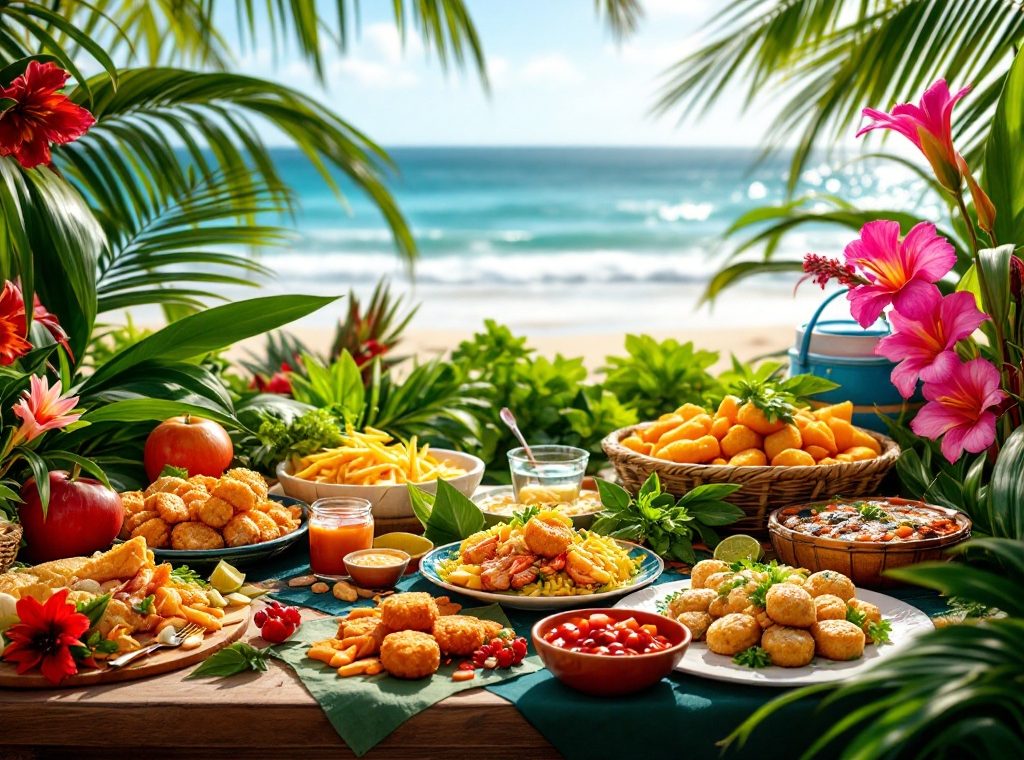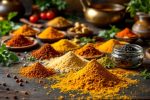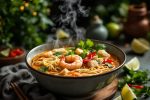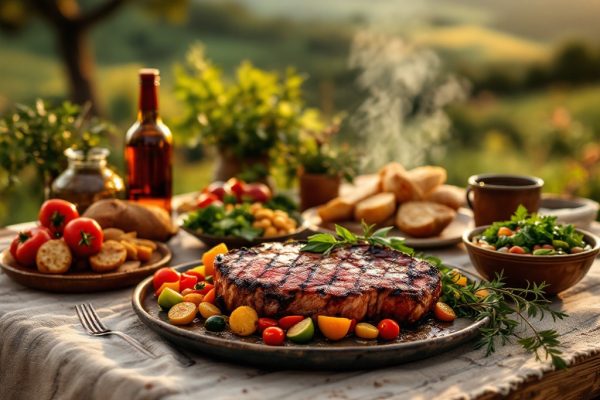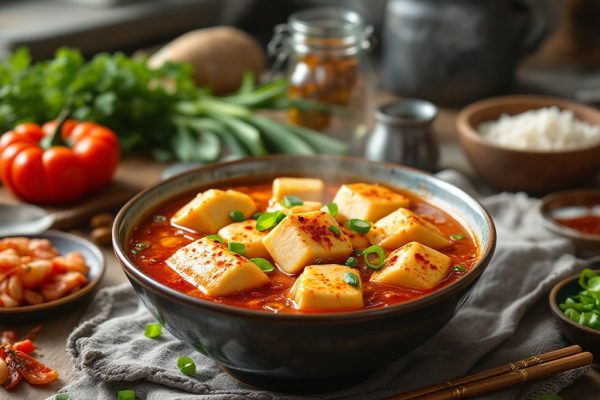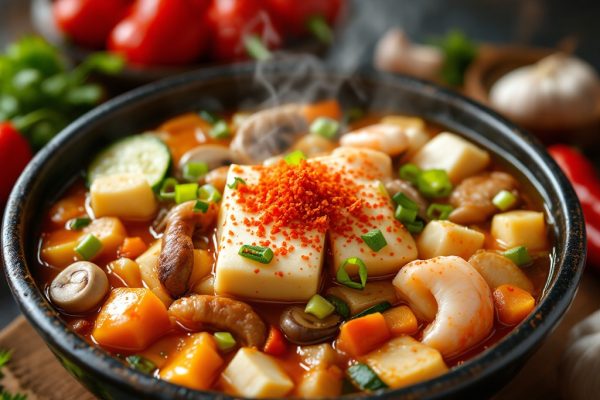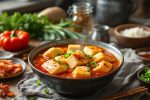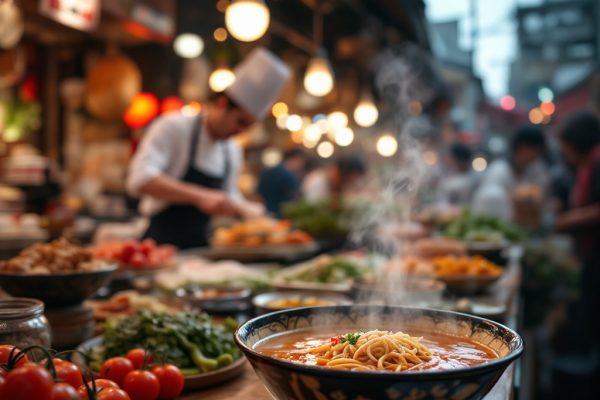Caribbean Cuisine: What Delicacies Are Hidden on the Pacific Ocean
Embark on a culinary adventure through the vibrant flavors of Pacific Island and Caribbean cuisine! From Hawaii’s kalua pig to Barbados’ flying fish and cou-cou, discover unique dishes shaped by diverse cultural influences. Explore the rich history of mofongo in Puerto Rico and savor the fresh seafood mastery of conch fritters and rondón. Dive into the regional variations and tantalizing spices that define these island delicacies. Continue reading to uncover the secrets of these culinary traditions and plan your own flavorful escape!
Important information
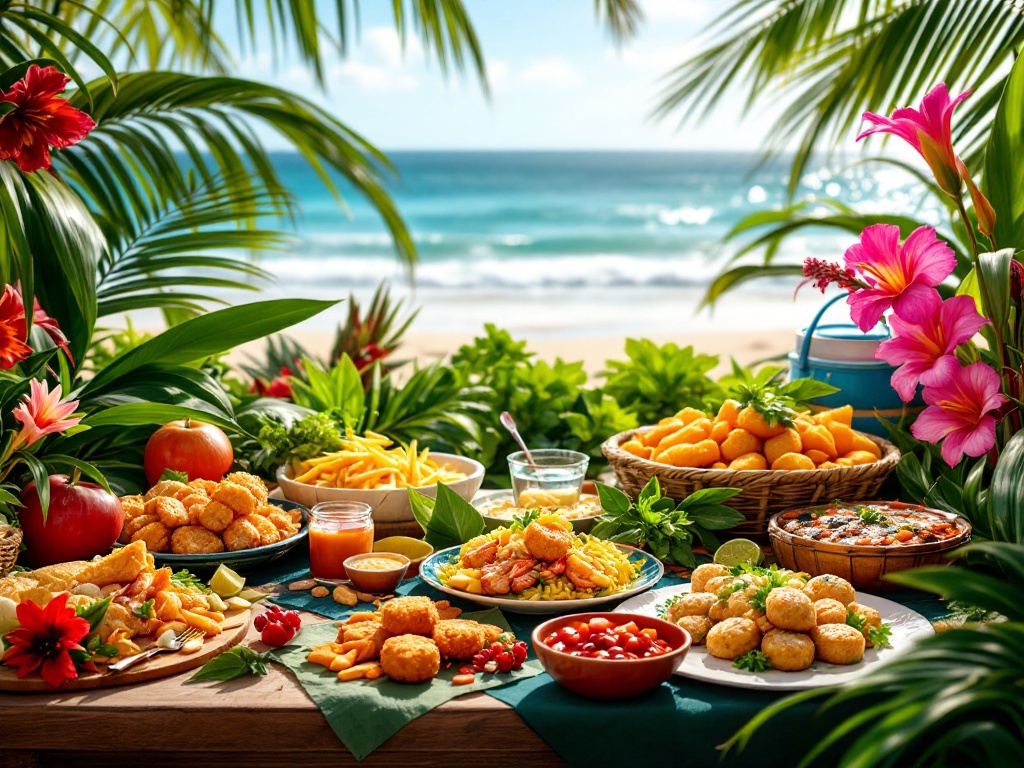
- Caribbean cuisine is a fusion of African, Amerindian, European, East Indian, Arab, and Chinese influences, resulting in unique and flavorful dishes.
- Seafood plays a vital role in Caribbean cuisine, with popular dishes like conch fritters, rondón (seafood stew), ceviche, and sea eggs.
- Regional variations exist, reflecting the diverse cultural heritage and available resources of each island. Examples include jerk chicken in Jamaica, flying fish and cou-cou in Barbados, and mofongo in Puerto Rico.
- Local staples like yams, cassava, plantains, and tropical fruits are frequently used, often combined with imported spices and diverse cooking techniques.
- Enslaved people played a significant role in shaping Caribbean cuisine, developing cherished recipes using readily available resources like fish and conch.
Island Cuisine on the Pacific Ocean
Pacific Island cuisines offer a vibrant tapestry of flavors. From Hawaii’s kalua pig, slow-roasted in an underground oven, to Fiji’s kokoda, a ceviche-like dish of raw fish marinated in coconut milk and lime, each island presents a unique culinary adventure. Fresh seafood is a cornerstone of these cuisines. The seafood is complemented by an abundance of tropical fruits and distinctive spices. Regional variations are notable, reflecting both the islands’ resources and their rich cultural traditions. Ingredients like taro root and breadfruit add further depth to these diverse cuisines. The unifying element is fresh, flavorful food, a testament to the Pacific’s abundant natural bounty.
Unique Delicacies and Regional Variations
Island nations offer incredible culinary journeys.
Explore the diverse flavors of the Caribbean:
Jamaica
Jamaica’s jerk chicken is world-renowned, a fiery delight that tantalizes taste buds. For breakfast, savor the unique combination of ackee and saltfish.
Trinidad and Tobago
Experience the vibrant flavors of rice and pigeon peas, a staple dish that embodies the island’s culinary heritage.
Barbados
Indulge in the local delicacy of flying fish and cou-cou, a true taste of Barbados.
These regional dishes showcase the Caribbean’s diverse heritage, blending indigenous, African, European, and Asian influences to create vibrant and unique flavors.
Cultural Exchange and Culinary Adventure
Embark on a delectable adventure through Caribbean culinary tourism, a unique way to savor the islands’ diverse cultures. From the staple callaloo soup, a verdant leafy stew, to the fiery jerk chicken marinated in a vibrant spice blend, each dish tells a story of the islands’ rich heritage. This culinary tapestry weaves together African, European, and Indigenous influences. Exploring local markets offers an even more immersive experience, where food stalls become hubs of cultural exchange, connecting visitors with the heart of Caribbean culinary traditions—a true taste of island life.
Traditional Caribbean Dishes
Caribbean cuisine bursts with flavor, reflecting a vibrant tapestry of African, Amerindian, European, East Indian, Arab, and Chinese influences. This fusion creates unique dishes, often featuring local staples like yams and cassava combined with imported spices and diverse cooking techniques. Jamaican jerk chicken embodies this culinary blend, as does Trinidad’s popular street food, doubles. The region’s abundant seafood also plays a vital role, showcasing its rich heritage. Historically, fish and conch provided sustenance, particularly for enslaved people who developed cherished recipes using these readily available resources, passing down their culinary traditions through generations.
Flying Fish and Cou Cou: Barbados’ National Dish
Flying fish and cou cou is the national dish of Barbados. This savory meal typically features fried or steamed flying fish served with a cornmeal and okra dish similar to polenta, called cou cou. The dish emphasizes the role of seafood, particularly flying fish known for gliding above the water’s surface, in Barbadian cuisine. Seasoned with local spices, cou cou complements the fish perfectly, creating a beloved staple enjoyed by both locals and tourists. This culinary combination reflects the cultural importance of fishing in Barbados.
Mofongo: A Puerto Rican Delight
Mofongo is a flavorful Puerto Rican dish featuring fried green plantains mashed with garlic, salt, and often crispy pork cracklings (chicharrón). It is frequently served with a savory broth and can be filled with various meats or seafood. This dish boasts a fascinating history, blending African, Spanish, and indigenous Taino influences.
Origins of Mofongo
The Taino people contributed the essential plantains. African culinary traditions shaped the frying and mashing techniques. Spanish cuisine introduced ingredients like garlic and pork, further enriching the dish.
Mofongo Today
Regional variations across Puerto Rico showcase mofongo’s adaptability, incorporating diverse seasonings and fillings. Mofongo stands as a delicious and culturally significant symbol of Puerto Rico’s rich culinary heritage.
Seafood Mastery in Caribbean Cuisine
Caribbean cuisine is renowned for its fresh seafood. Fish, conch, lobster, and crab are staples, historically abundant and central to many iconic dishes. Caribbean chefs expertly transform these ingredients into diverse, flavorful meals showcasing the region’s unique culinary traditions. Here are some must-try Caribbean seafood dishes:
- Conch Fritters: tender conch is combined with diced vegetables and spices, then deep-fried to a golden crisp, offering a delightful introduction to this local delicacy.
- Rondón: a hearty seafood stew featuring fish, shellfish, and vegetables simmered in a flavorful coconut milk broth, with each island adding its own unique twist.
- Ceviche: a refreshing, no-cook dish where raw white fish is “cooked” in citrus juices, infused with the flavors of onions, peppers, and cilantro.
- Sea Eggs (Sea Urchin Roe): a unique Caribbean delicacy enjoyed raw, pickled, or in sauces, offering a distinctive taste of the islands.
Conch Fritters: A Typical Seafood Dish
Conch fritters, a Caribbean delicacy, are especially popular in the Bahamas. These savory snacks feature tender conch meat encased in a golden-brown, deep-fried batter made from flour and eggs. Often served with a dipping sauce, they are an ideal appetizer, highlighting the region’s unique seafood and culinary ingenuity.
Rondón: The Quintessential Coastal Seafood Stew
Experience the Caribbean’s vibrant culinary heritage with Rondón, a flavorful seafood stew. This coastal classic bursts with the fresh tastes of fish, shrimp, and clams, all simmered in a rich coconut milk broth. Hearty vegetables like yams, plantains, and okra add depth to this unforgettable dish. Rondón is a must-try for a true taste of the islands.
Ceviche: Raw White Fish Cured in Citrus
Ceviche is a seafood dish made with raw white fish “cooked” in citrus juices, typically lime or lemon. The acid in the citrus denatures the fish proteins, creating a firm, cooked texture. Common additions include:
- onions,
- cilantro,
- chilis.
Some Caribbean variations incorporate coconut milk into the marinade. Shrimp is also a popular choice for ceviche.
Sea Eggs: A Caribbean Delicacy
Sea eggs, a type of sea urchin prized throughout the Caribbean, are a culinary staple enjoyed in diverse dishes. Grenadians, for instance, savor them scrambled with eggs for breakfast or fried with onions and carrots. Whether steamed or fried, these delicacies complement rice, avocado, or cucumber. The versatile sea egg truly embodies the Caribbean’s rich culinary heritage.

